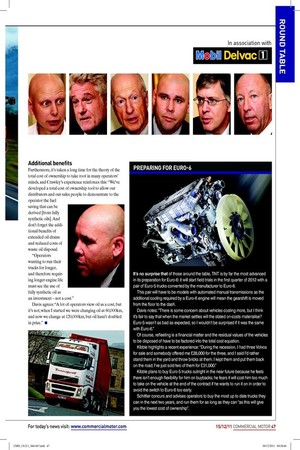PREPARING FOR EURO-6
Page 41

If you've noticed an error in this article please click here to report it so we can fix it.
It’s no surprise that of those around the table, TNT is by far the most advanced in its preparation for Euro-6: it will start field trials in the first quarter of 2012 with a pair of Euro-5 trucks converted by the manufacturer to Euro-6.
This pair will have to be models with automated manual transmissions as the additional cooling required by a Euro-6 engine will mean the gearshift is moved from the floor to the dash.
Davis notes: “There is some concern about vehicles costing more, but I think it’s fair to say that when the market settles will the stated on-costs materialise? Euro-5 wasn’t as bad as expected, so I wouldn’t be surprised if it was the same with Euro-6.” Of course, refleeting is a financial matter and the residual values of the vehicles to be disposed of have to be factored into the total cost equation.
Kibble highlights a recent experience: “During the recession, I had three Volvos for sale and somebody offered me £28,000 for the three, and I said I’d rather stand them in the yard and throw bricks at them. I kept them and put them back on the road; I’ve just sold two of them for £31,000.” Kibble plans to buy Euro-5 trucks outright in the near future because he feels there isn’t enough flexibility for him on buybacks; he fears it will cost him too much to take on the vehicle at the end of the contract if he wants to run it on in order to avoid the switch to Euro-6 too early.
Schittler concurs and advises operators to buy the most up to date trucks they can in the next two years, and run them for as long as they can “as this will give you the lowest cost of ownership”.



















































